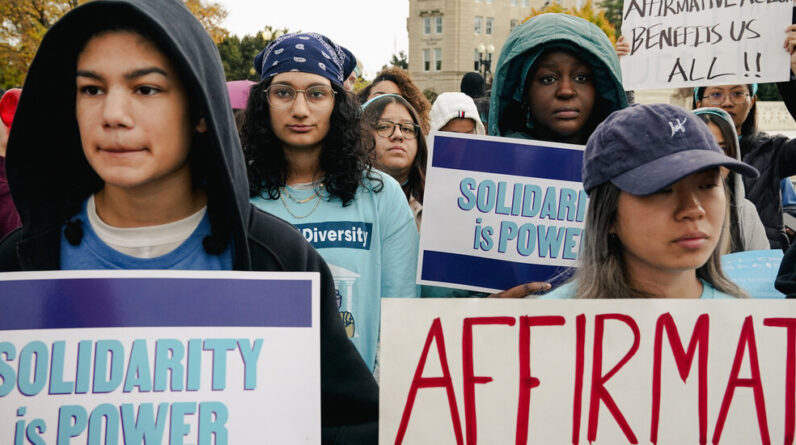
Half of Americans disapprove of colleges and universities taking race and ethnicity into account in admissions decisions, according to a recent report from the Pew Research Center, while a third approve of this practice. But a look at recent polls on the topic shows that attitudes about affirmative action differ depending on who you ask and how you ask.
The Pew survey shows a clear divide along racial and ethnic lines: Most white and Asian adults disapprove of racial consideration in admissions, while black Americans largely approve and Hispanics are almost evenly split.
Most respondents who disapproved of affirmative action said the policy made the admissions process less fair overall, and a narrow majority said it would result in the acceptance of less qualified students. Supporters of affirmative action, on the other hand, largely said it ensures equal opportunity and improves students’ educational experiences.
A parallel study published by Pew this month showed a partisan divide on the issue among Asian Americans, the group at the center of one of the Supreme Court cases. Most Asian Democrats who had heard about affirmative action said it was a good thing, while Asian Republicans were more likely to say it was a bad thing. Asian Republicans with a graduate degree were almost twice as likely to disapprove of affirmative action as those with a high school diploma or less.
Polls on affirmative action have proven to be very sensitive to how questions about the issue are asked, possibly reflecting some uncertainty or ambivalence in public opinion.
When questions are raised about the role of the Supreme Court in deciding the issue, there is usually a greater consensus among racial and ethnic groups in favor of affirmative action. when a May poll by The Associated Press and NORC asked whether the Supreme Court should ban consideration of race in college admissions, about 60 percent of Americans, almost evenly across racial and ethnic groups, said the court would not to do.
However, when asked explicitly whether race and ethnicity should be considered in admissions, the majority of the audience—white and non-white adults alike—said it should not be a factor , according to a February report. Reuters/Ipsos survey. And in the same way, a different Pew survey from last year found that large majorities across racial and ethnic groups said race “shouldn’t be a factor” in admissions decisions.
The different levels of support for affirmative action in the most recent Pew poll may reflect not only a contrast in how the question is asked, but that it specifically referred to selective colleges that use the practice to “increase racial and ethnic diversity of school,” but also changing attitudes about affirmative action over time. The issue has gained more prominence in the public conversation after California voters rejected affirmative action at the polls in 2020 and as the Supreme Court weighed in on the issue, suggesting that a subset of voters might take a fresh look at the concept.
[ad_2]
Source link





